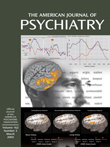Impact of Trait Impulsivity and State Aggression on Divalproex Versus Placebo Response in Borderline Personality Disorder
Abstract
OBJECTIVE: The authors’ goal was to determine whether specific pretreatment clinical characteristics differentially predict favorable treatment response to divalproex versus placebo for impulsive aggression in patients with borderline personality disorder. METHOD: Fifty-two outpatients with DSM-IV borderline personality disorder were randomly assigned to receive divalproex (N=20) or placebo (N=32), double-blind, for 12 weeks. Trait impulsivity symptoms were determined by using the Barratt Impulsiveness Scale, and state aggression symptoms were determined by using the Overt Aggression Scale modified for outpatients. Affective stability was determined by using the Young Mania Rating Scale and the Hamilton Depression Rating Scale. Analyses were performed to identify possible baseline symptom domains that predict treatment response. RESULTS: Divalproex was superior to placebo in reducing impulsive aggression in patients with borderline personality disorder. Divalproex-treated patients responded better than placebo-treated patients among those with higher baseline trait impulsivity symptoms and state aggression symptoms. The effects of baseline trait impulsivity and state aggression appear to be independent of one another. However, baseline affective instability did not influence differential treatment response. CONCLUSIONS: Both pretreatment trait impulsivity symptoms and state aggression symptoms predict a favorable response to divalproex relative to placebo for impulsive aggression in patients with borderline personality disorder.



